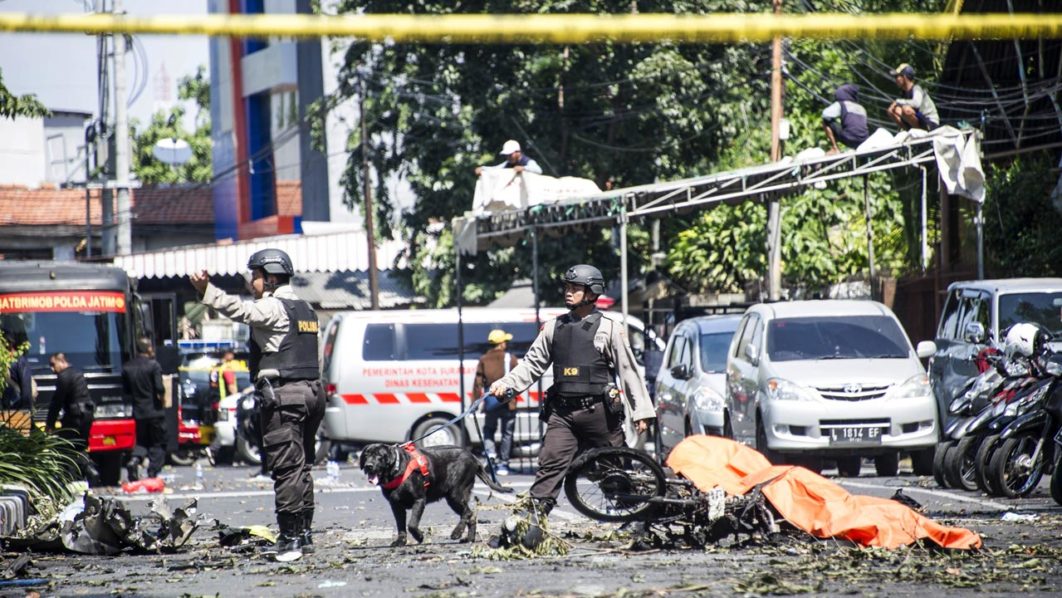
A series of blasts, including a suicide bombing, struck churches in Indonesia on Sunday, killing at least nine people and wounding dozens in the deadliest attack for years in the world’s biggest Muslim-majority country.
The nation has been on high alert for attacks by homegrown militants, including some claimed by the Islamic State group.
No one has yet claimed responsibility for the bombings during Sunday services in Indonesia’s second-biggest city Surabaya.
Three churches were hit by the bombings around 7:30 am (0030 GMT) in what appeared to be coordinated attacks that included suicide and possibly vehicle bombings.
Television footage appeared to show a person on a motorcycle driving into the grounds of a church before a bomb was detonated.
Other images showed a vehicle engulfed in flames and plumes of thick black smoke.
Police experts disarmed bombs at the Gereja Pantekosta Pusat Surabaya (Surabaya Centre Pentecostal Church).
Other images showed a body outside the gate of Santa Maria Catholic church and motorcycles toppled over amid the debris.
‘People screaming’
At least one of the attackers was killed when the bomb exploded at Santa Maria, police said.
“I was frightened… many people were screaming,” 23-year-old witness Roman told AFP after the blast there.
The attacks came just days after five members of Indonesia’s elite anti-terrorism squad and a prisoner were killed in clashes that saw Islamist inmates take a guard hostage at a high-security jail on the outskirts of Jakarta.
The Islamic State group claimed responsibility for that incident although police denied its involvement.
Police on Sunday said four suspected members of the radical group Jamaah Anshar Daulah had been killed in a shootout during raids linked to the prison riot, but would not comment on whether the group was connected to Sunday’s bombings.
Nearly 90 percent of Indonesia’s 260 million people are Muslim, but there are significant numbers of minority Christians, Hindus and Buddhists.
Concerns about sectarian intolerance have been on the rise, with churches targeted in the past.
Police shot and wounded an IS-inspired radical who attacked a church congregation outside Indonesia’s cultural capital Yogyakarta with a sword during a Sunday mass in February. Four were injured.
In 2000 bombs disguised as Christmas gifts delivered to churches and clergymen killed 19 people on Christmas Eve and injured scores more across the country.
‘Less professional’
The archipelago nation of some 17,000 islands has long struggled with Islamic militancy, including the 2002 Bali bombings that killed 202 people — mostly foreign tourists — in the country’s worst-ever terror attack.
Sunday’s bombings had the highest death toll since nine people were killed in 2009 attacks on two luxury hotels in Jakarta.
Security forces have arrested hundreds of militants during a sustained crackdown in recent years that smashed some networks, and most recent attacks have been low-level and targeted domestic security forces.
But the coordinated nature of Sunday’s bombings suggested a higher level of planning, analysts said.
“Recent (previous) attacks have been far less ‘professional’,” Sidney Jones, an expert on Southeast Asian terrorism and director of the Jakarta-based Institute for Policy Analysis of Conflict, told AFP.
The emergence of IS has proved a potent new rallying cry for radicals, sparking fears that homegrown extremist outfits could get a new lease of life.
A gun and suicide attack in the capital Jakarta left four attackers and four civilians dead in 2016, and was the first assault claimed by IS in Southeast Asia.



